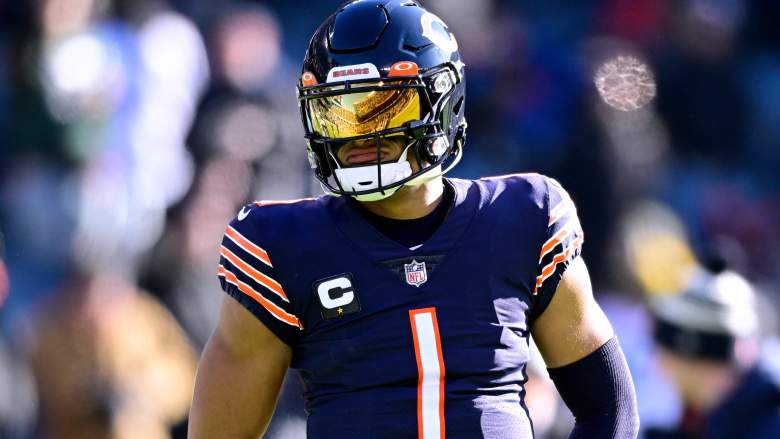
Getty Justin Fields #1 of the Chicago Bears warms up before the game against the Green Bay Packers at Soldier Field on December 04, 2022 in Chicago, Illinois. (Photo by Quinn Harris/Getty Images)
The Chicago Bears’ chances of pulling out a win against the Green Bay Packers on Sunday were dashed when veteran cornerback Jaire Alexander picked off Justin Fields with 2:48 remaining in the fourth quarter on a budding comeback drive, but it sounds like the Bears feel the mistake was more on the receiver than quarterback.
On the play in question, Fields had made a first-down anticipation throw to wide receiver Equanimeous St. Brown, who was running a dig route against Alexander. St. Brown, however, was too slow getting out of his break and Alexander quickly took advantage, jumping the ball and giving it back to the Packers with a two-point lead.
Alexander certainly didn’t mince words about the play and his former Packers teammate in his postgame talk with reporters, telling them that St. Brown is just “real slow, so it was just easy.” And while the Bears didn’t go as far as to roast St. Brown for his mistake, both Fields and Bears head coach Matt Eberflus made it clear he should have done more.
“I think 23 (Alexander) made a great play on that play,” Fields said in the postgame of the 28-19 loss to the Packers. “EQ was underneath him, but … once you throw that ball, you anticipate the throw and, boom, he jumped it. Really, at that point, you’d like to see the receiver come back to the ball. We always try to tell the receivers that those DBs want that pick each and every time, so they’re going to attack that ball. It was just a timing throw, an anticipation throw, and I think 23 just made a good play on it.”
Eberflus: WRs Need to Do ‘Great Job’ on Trust Throws
Eberflus had a similar criticism for St. Brown. While he said he would classify it as a “bad throw” due to the fact that it ended in an interception, he explained it was a situation where the Bears want Fields to trust his receiver and anticipate him to make the necessary break against the defender, which St. Brown didn’t do quickly enough.
“Justin’s been ripping that pass a couple times earlier, and that’s a trust throw,” Eberflus said. “When you have a trust throw, that means he’s reading it and he’s gonna let it rip. The (receivers) have got to do a great job of stepping up, making those plays, and I thought the corner made a nice play. He jumped it, but hopefully, our receiver can help out and knock that down, if possible. It was unfortunate that time.”
There have been stretches of good and moments of not-so-good from St. Brown in his first season with the Bears, and nothing might exemplify that more than how he played against his former team on Sunday. St. Brown made three receptions for a team-high 85 receiving yards against the Packers, getting the majority of his yardage from a 55-yard deep ball that Fields placed perfectly over the top of Alexander and into his hands. All in all, that’s a good performance — but it is the mistake that will be remembered given how it deflated the Bears’ chances of bouncing back.
Fields Show Growth as Passer Despite Late-Game INTs
The two fourth-quarter interceptions might feel like absolute sinkers in terms of how Fields played against the Packers in Week 13, but Bears fans got to see another week of legitimate growth as a passer from their quarterback, especially coming off a shoulder injury that sidelined him for Week 12’s loss against the New York Jets.
Fields completed 80% of his passes (20 of 25) and reached a season-high 254 passing yards against the Packers, averaging an impressive 10.2 yards per passing attempt. There were also a handful of big-time throws from him, including his 56-yarder to St. Brown in the second quarter and his 49-yard bomb to N’Keal Harry in the fourth. On top of that, Fields also rushed six times for 71 yards with a 55-yard scramble that turned into the Bears’ first touchdown of the afternoon.
Of course, Fields’ zero touchdown passes and two interceptions are going to be the center of the conversation leading up to next week, but context is important on both of the picks. The interception on the throw to St. Brown — based on the comments from Fields, Eberflus and Alexander — was more about the receiver not doing his part than it being a bad decision from Fields, even though the quarterback deserves some blame.
The second interception more directly falls on Fields’ shoulders, but he was also facing down a nine-point deficit with 44 seconds on the clock and simply trying to force a play that could give the Bears a slim chance of a comeback. While it was still a bad throw, it isn’t necessarily a throw he would make without the desperation element at play.
Comments
Bears’ Justin Fields Sounds Off on WR’s Role in INT vs. Packers